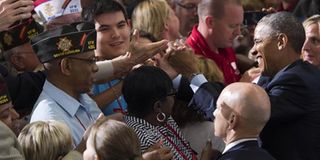UN backs Iran deal, set to lift sanctions

US President Barack Obama greets attendees after speaking at the 116th National Convention of the Veterans of Foreign Wars (VFW) at the David Lawrence Convention Centre in Pittsburgh, Pennsylvania, July 21, 2015. PHOTO | SAUL LOEB |
What you need to know:
- Obama meets with veterans over the Iran deal.
- There is a smarter more responsible way to protect our national security, president says.
UNITED NATIONS
The UN Security Council unanimously adopted a resolution on Monday endorsing the historic deal on Iran’s nuclear program and cleared a path to lift sanctions crippling its economy.
It marks formal UN approval for the hard-won, groundbreaking agreement reached between Tehran and the five permanent members of the Security Council plus Germany, after 18 straight days of talks that capped almost two years of momentous negotiations.
The passing of the resolution sets in motion a gradual process — conditional on Iran abiding by the deal — that can terminate seven UN resolutions imposing sanctions on Iran since 2006.
The agreement with Tehran was reached on Tuesday in Vienna by the UN council’s five permanent members — Britain, China, France, Russia and the United States, plus Germany.
US President Barack Obama said he hoped the resolution would “send a clear message” that diplomacy is “by far our strongest approach to ensuring that Iran does not get a nuclear weapon.”
Faced with the prospect of Iranian oil returning to the global market, crude prices fell for a fourth straight session, dropping to $50.15 a barrel on the New York Mercantile Exchange.
In the Security Council, ambassadors said the years of hard work on Iran should become a blueprint for how the world deals with other crises such as those in Syria and Yemen.
“When our nations truly unite to confront global crises, our influence grows exponentially,” said US envoy Samantha Power.
“It should motivate us to do far more.”
Russian ambassador Vitaly Churkin said: “We turn not simply a page but a whole chapter in the work of the Council by creating a new reality.”
Meanwhile, US President Barack Obama told a gathering of military veterans today that hardheaded diplomacy with Iran could avoid the type of “unnecessary wars” for which they have paid the highest price.
A steely Mr Obama travelled to Pittsburgh, Pennsylvania where he urged the 1.9 million member Veterans of Foreign Wars to give the nuclear deal with Tehran a chance.
He denounced those “chest beating” against the deal and said some of those opposed to it were the same ones who said the Iraq war would take months.
“We know the consequences of that choice,” he said. “And what it cost us in blood and treasure.
“There is a smarter more responsible way to protect our national security,” Mr Obama said. Insisting he was no peacenik afraid to deploy the military, Mr Obama boasted about a string of military operations that took high-ranking Al-Qaeda officials — including Osama bin Laden — off the battlefield.
“If you target Americans you will have no safe haven,” he said. But, he added, “real leadership” means not being afraid to negotiate.
Mr Obama has framed the recent nuclear deal as a choice between diplomacy and war.
While campaigning for the presidency in 2008, Obama told a battle-weary nation he would end the long and bloody conflict in Iraq as president made winding down the wars there and Afghanistan a priority. The Iran deal is seen as a cornerstone of Obama’s foreign policy legacy and the White House has been selling it at home since the historic agreement was reached last week in Vienna.





